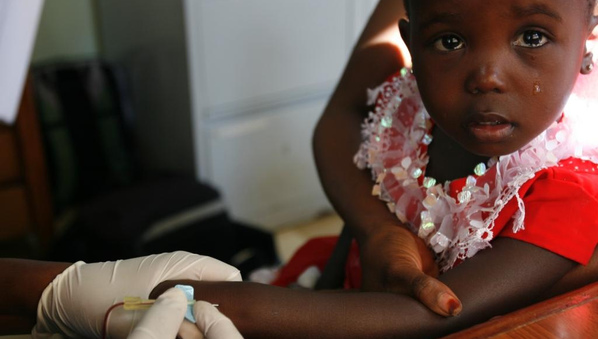Green light for malaria vaccine

The first malaria vaccine has received the green light from European regulators today, opening the door for vaccination campaigns for infants in Africa.
This a big leap forward for the RTS,S vaccine after decades of research. Also known under the commercial name Mosquirix, the vaccine is intended to protect children aged six weeks to 17 months against the mosquito-transmitted Plasmodium falciparum parasite that causes malaria.
Imperfect vaccine
“RTS,S is an imperfect vaccine, providing only partial protection against clinical malaria,” says Brian Greenwood, a clinical tropical medicine researcher at the London School of Hygiene & Tropical Medicine in the United Kingdom. Nevertheless, today’s approval is an “important landmark” that can help control malaria where other methods, such as using bed nets impregnated with insecticides, are not effective enough, Greenwood adds.
According to the World Health Organization, 562,000 people died from malaria in Africa in 2013, of whom 82 per cent were children under five.
“RTS,S is an imperfect vaccine but it has the potential to help control malaria in areas where measures are not effective.”
Brian Greenwood, London School of Hygiene & Tropical Medicine
The main evidence that the vaccine is safe and effective comes from a large clinical trial conducted in seven African countries, the European Medicines Agency said in a statement. According to this trial, Mosquirix provides “modest protection”, which decreases after one year, but despite this “limited efficacy”, its benefits outweigh the risks, the agency says.
Clinical trial
Observers have warned that it is still unclear how well the vaccine will perform outside the controlled setting of a clinical trial. For example, the vaccine may “give people a false sense of security”, causing them to stop using bed nets, say Seth Berkley, CEO of Gavi, the Vaccine Alliance, and Mark Dybul, executive director of the Global Fund to Fight AIDS, Tuberculosis and Malaria.
In addition, the vaccine’s effectiveness depends on infants getting a booster shot after an initial three doses. “In practice, what sort of dropout rate can we expect for that booster shot?” Berkley and Dybul ask in a statement.
Regulatory hoops
The vaccine still also has to jump through several regulatory hoops before it can be added to the toolbox against malaria in Africa. The “positive scientific opinion” from EMA’s committee for medicinal products for human use means that Mosquirix, which is intended for use outside the European Union, meets the same quality standards as those of medicinal products used in Europe.
Policy recommendations
The World Health Organization is now expected to issue policy recommendations for the use of Mosquirix in vaccination programmes, possibly in November. National regulators will then have to authorise the vaccine for use in each country.
GSK, the vaccine manufacturer, says that, to make the vaccine affordable, it will sell Mosquirix at a “not-for-profit price”, covering the cost of manufacturing plus “around five per cent”. This “small return” will be “reinvested in research and development for second-generation malaria vaccines, or vaccines against other neglected tropical diseases”, the company says.
Source: SciDev